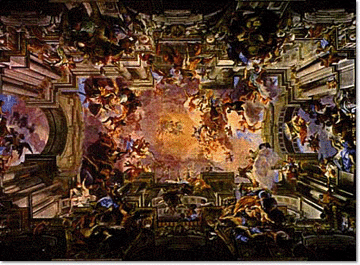History 182:
Expansion and Enlightenment
Prof. Cotts (cottsjd@whitman.edu)
Office: Maxey 211 (ph. 526-4789)
Office Hours: MW 2:45-4:00 Th 3:00-4:30

This course
introduces the history of western Europe from
approximately 1400 to 1800. The title of
the course includes just two of the many movements under discussion, and raises
some questions about what is and ought to be important in the period. Who was “enlightened” and by what? What was it that expanded and what were the
consequences of this development? How
does the analysis of different types of sources affect our understanding of
historical change? Underlying our
consideration of such meta-historical issues will be careful discussion of source
materials: literature, contemporary chronicles, political theory, and data on
material life. We will explore the
traditional narrative of cultural ferment and religious change along with the
rise of modern-style state institutions, the expansion of European civilization
to the
Books for Purchase
Lynn Hunt, et. al., The Making of the West: Volume B, 1320-1830
Machiavelli, The Prince (Penguin)
More, Utopia (Norton)
Las Casas, Short Account of the Destruction of the
Carlo Ginzburg, Night Battles (Johns
Jonathan Spence, The Question of Hu
Jean-Jacques Rousseau, Basic Political Writings (Hackett)
These texts are all available in the Whitman College Bookstore. In addition, a binder containing other readings will be placed on reserve in Penrose Library.
Course
requirements
1. Class attendance and participation. You are expected to attend all class meetings and to participate vigorously, insightfully, and respectfully in class discussions. While attendance and participation represent 20% of the course grade, persistent non-attendance is grounds for failing the course. If you feel uncomfortable speaking in class, please come chat with me about how we can create an encouraging environment in which you can share your ideas with your colleagues.
2. A midterm examination (15% of course grade) and a final examination (25%).
3. Two short (4-5 pages) papers, formatted according to the conventions found in the Chicago Manual of Style, 15th edition, written in response to prompts provided by the instructor. Each paper will count for 20% of your course grade.
Schedule of
classes and readings
January
18 Introduction to the course
20 Periodization and the problem of the Renaissance
Brady et. al., introduction to Handbook of European History, 1400-1600, xiii-xxii (reserve packet)
21 Material culture and the “long term”
Fernand Braudel, selections from The Structures of Everyday Life (reserve packet)
25 The crises of the fourteenth century
Hunt, 467-503
The papal bull Unam sanctam online at
http://www.fordham.edu/halsall/source/b8-unam.html
Sources on the Black Death online at:
http://www.fordham.edu/halsall/jewish/1348-jewsblackdeath.html
http://www.fordham.edu/halsall/source/boccacio2.html
27 The rise of “humanism” in
Petrus Paulus Vergerius: “The New Education” at
http://www.fordham.edu/halsall/source/vergerius.html
Petrarch, The Ascent of
Lorenzo Valla, “On the Glory of the Latin Language” (reserve packet)
Two letters of Laura Cereta (reserve packet)
28 Was there a Renaissance “philosophy of man”?
Marsilio Ficino, “The Soul of Man” (reserve packet)
February
1 A revolution in aesthetics?
Michelangelo Buonarroti, selected poems (reserve packet)
Giorgio Vasari, selections from Lives of the Artists (reserve packet)
3 Politics and the state in
Machiavelli, The Prince, xv-xxix; 3-44
4 Machiavelli: the state as a work of art
8 The northern Renaissance
More, Utopia, 3-30
10 Politics and the state in
11 The humanist as statesman
15 The economy of Renaissance Europe
Bartolome de las Casas, A Short History of the Destruction of the Indies, xiii- xli
17 Exploration and conquest
18 The destruction of the
22 Religious life on the eve of the Reformation
The Papal Bull Unam sanctam of 1302 (handout)
24 Martin Luther’s revolt
Hunt, 552-56
25 Humanism, the Reformation, and free will
Erasmus, “On Free Will” (reserve packet)
March 1 Calvin and the expansion of the Reformation
Calvin, “On Free Will and Predestination” (reserve packet)
Ecclesiastical Ordinances for
The Schleitheim
Confession (handout)
3 The reformation and politics: the case of
http://www.fordham.edu/halsall/source/h8-glastonbury.html
The Act of Supremacy at:
http://www.northpark.edu/history/Classes/Sources/ActSupremacy.html
The Thirty-Nine Articles at:
http://dspace.dial.pipex.com/town/terrace/adw03/peel/religion/39articles.htm
4. The Catholic Reformation
Excerpts from St. Ignatius at: http://www.fordham.edu/halsall/source/loyola-spirex.html
***Tuesday, March 8: Midterm Examination
10 Gender trouble at the time of the Reformation
11 Print culture in the sixteenth century
29 Witchcraft and Gender
Selections from the Malleus Maleficiarum (reserve packet)
Witch pamphlets from
The witchcraft trial of Suzanne Gaudry (reserve packet)
Carlo Ginzburg, Night Battles, introductions, prefaces, and 1-32
31 High and low culture in the sixteenth century
April 1 Night Battles
5 no class
7 The age of religious wars
Natalie Davis, “The Rites of Violence,” Past and Present 59 (1973), available online at www.jstor.org
8 Thirty years’ war and the “general crisis” of the seventeenth century
12 The origins of the Scientific Revolution
http://www.fordham.edu/halsall/mod/galileo-tuscany.html
14 The growth of absolutism
Selections from the Memoirs of the Duc de Saint-Simon (handout)
15 Conflict in
John Locke, selections from the Second Treatise on Government
(handout)
19 Social history of the Old Regime
21 The Atlantic System and the World Economy
Jonathan Spence, The Question of Hu, 3-87
22
26 The European state system
28 The Enlightenment
Jean-Jacques Rousseau, Basic Political Writings, 33-60
29 Rousseau and the social contract
May 3 The end of the Old Regime in
Siéyès, “What is the Third Estate?” (handout)
Selected cahiers
5 The French Revolution’s “liberal phase”
Documents on the storming of the Bastille (handout)
“Declaration of the Rights of Man and of the Citizen” (handout)
Olympe de Gouges, “The Rights of Woman”
6 The Terror and the European reaction to the Revolution
Maxmilien Robespierre, “On the Principles of Political Morality” (handout)
Report of the dedication of a
Napoleon Bonaparte proclaims the “Revolution is ended” (handout)
10 Summary and Review